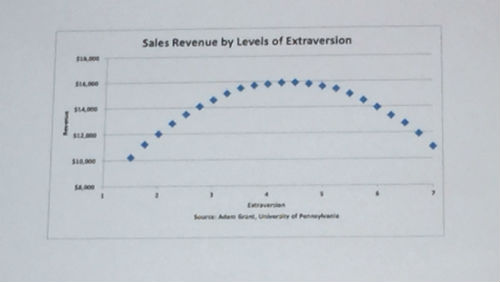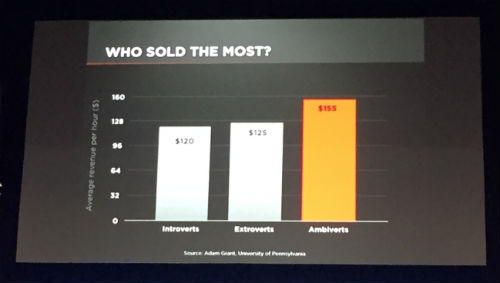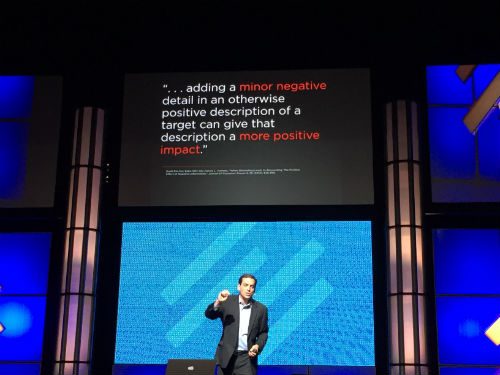
This week’s forecast calls for heavy rain. Not from the sky, but from the stage at Authority Rainmaker 2015, hosted by CopyBlogger. The conference got off to a bang with an electrifying keynote from Daniel Pink, TV show host, keynote speaker and author of To Sell Is Human: The Surprising Truth About Moving Others.
According to Dan, the buying experience has changed more in the last ten years than in the previous 100, due in large part to the unprecedented access to information that the average consumer has today. However, many companies’ sales processes have yet to catch up to the meteoric changes that the internet has brought to the marketplace
Never one to rely on anecdotes or opinions alone, Daniel wowed the audience with several surprising scientifically backed findings on how selling has changed and what a modern salesperson needs to do to be successful in the digital age.
Two of the most important themes from Daniel’s session were that sales is (or should be) a part of nearly everyone’s job today, whether or not it appears in your job title and that content marketing is more important than ever for businesses to survive and thrive in an era where the balance of information power has shifted from sellers to buyers.
Below are some valuable insights and takeaways from Daniel’s session that all content marketers should pay close attention to.

Neither Strong Introverts nor Extroverts are Great at Sales: The Sweet Spot is in the Middle
Traditional wisdom holds that extroverts make the best salespeople. It takes courage to approach prospects, push for the sale and face the ‘ocean of rejection’ that characterizes the average day in the life of a sales professional. Logically, it makes sense that extroverted people, characterized by friendliness, gregariousness and fearlessness at approaching others would be the best at this.
Indeed, research comparing introverts and extroverts showed that extroverts are more likely to pursue sales careers, get hired and win promotions. But, in terms of generating actual sales, the strong extroverts performed only slightly better than the strong introverts.
Interestingly, a third group called ambiverts outperformed both groups by a huge margin. Ambiverts are people who are in the middle of the introversion / extroversion spectrum. These are the people that aren’t afraid to initiate conversations, but don’t need to be at the center of them. They know when to speak up and when to listen.

Content Marketing Takeaway
Effective promotion of your content is absolutely essential for success. After all, nobody can act on a message they don’t see. However, over-zealous promotion can quickly make your message ineffective or even counter-productive.
I can’t count the number of times I have been turned off from a company’s offerings simply because they pushed their message too hard. Emails gushing about how they have the perfect solution to whatever my problem may be (with no evidence of any actual research into my needs), re-targeting ads that follow me everywhere I go on the web for months or direct social messages begging me to follow them on every channel they have without demonstrating how I would stand to benefit are just a few ways to kill your message.
Marketers would do well to take a good hard look at the content they are creating and distributing. Are you providing any value to your community or just hyping yourself? Are you listening and responding to the needs of your customers and prospects or simply broadcasting how awesome your offerings are?
Questions Beat Statements (Most of the Time)
“We’re the best!” “You can’t live without our product!” Heard these kinds of statements from salespeople before? Of course you have. Did it work? Maybe, but probably not.
How about instead, “How can we help you?” “What challenges or pain points are you experiencing?” “What features are important to you in a solution like this?”
Questions tend to work much better for getting the sale because they encourage prospects to think for themselves and draw their own conclusions about your products and services. Research has shown many times that people are much more invested in conclusions, feelings and opinions that they arrive at themselves. Questions help people make up their own minds; statements don’t give them that chance.
However, the caveat is that this works both ways. If prospects reach a negative conclusion about what you’re offering, it will also be a strong one.
Content Marketing Takeaway
In today’s always-on digital sales landscape where tons of information is available with a few clicks, it’s pretty easy for prospects to find out a lot about your company’s reputation. Oftentimes they will make up their minds before ever directly contacting anyone. If the information they find reflects negatively on your company or just isn’t compelling enough to result in action, that email or phone call won’t come.
Effective content marketing means creating and promoting content that attracts prospects to your brand, engages them by answering questions, guides them through the decision process and compels them to take action to close the deal.
Potential prospects will find out plenty about your business whether you want them to or not, so it’s critical to make sure you’re putting your best foot forward.

Honesty about Small Shortcomings can Shine a Positive Light on Strengths
Despite what many overly enthusiastic salespeople would tell you, the simple fact is that no product or service is perfect for everyone. People have different needs, preferences, interests and motivations. One of the great things about the crowded marketplace we live in today is that we have more choices than ever before.
The breadth of unique products and services available means that no matter how niche and specific your needs are, there’s a good chance there’s a company that can deliver a hand-in-glove solution, but the tradeoff is that many won’t be a great fit. And that’s ok.
In order to retain customers for the long term, it’s important to be up front about what your solution won’t do. After all, even if you do manage to sweep something under the rug during the sales process, customers will eventually find any hidden drawbacks and may not want to do business with your company again (and even worse, may tell others about their poor experience).
Research from Danit Ein-Gar, Baba Shiv and Zakary L. Tormala has shown that prospects who are exposed to minor negative information about a product along with the standard positive selling points can result in higher sales compared to a group who was only shown positive points. Often referred to as the Contrast Principle, the reason for this finding is that the small negatives can actually serve to highlight the positive attributes.
The caveat here is that the minor negative information you share must indeed be minor. Rather than serving to highlight the positives, truly significant problems are likely to overshadow your good points. But honestly, your goal should be to fix big problems in your offerings rather than worry about hiding them.
Content Marketing Takeaway:
Be upfront about what your products and services don’t do and who likely isn’t going to benefit from working with you. Even though you may end up turning a few prospects away, honesty will build the trust that is essential for generating sales from your true core audience.
And who knows, maybe one of the people who your product wasn’t a fit for today will come back later when you can help them or refer you to others. Honesty and transparency are the ultimate demonstrations of respect.

Buyers Have More Power than Sellers
In the old days, salespeople held all the cards. If you wanted to fly somewhere for a vacation, you had to work with a travel agent because they were the only ones who had access to pricing, packages and booking tools. When deciding on a new car, you had to take the word of car sales reps on which model was right for you and how much you should pay for it.
Today, the tables have turned. Services like TripAdvisor have empowered travelers with all the information and tools they need to be their own travel agents. Consumer Reports offers prospective car buyers with information on quality and Kelly Blue Book arms people with accurate vehicle prices.
Because of the unprecedented access and power that the average consumer has available at their fingertips, the role of salespeople has shifted from gatekeepers to partners. Today’s customer knows far more about what they need and who can deliver it than ever before. To be successful, salespeople should focus on helping prospects and customers have the best experience possible.
Daniel jokingly termed the 2000’s as the age of ‘seller beware’, but fear not, courageous salespeople, for content marketers have your back now more than ever.
Keep your eye here on Online Marketing Blog as well as Instagram, Flickr, Pinterest and Twitter @TopRank for coverage of the Authority Rainmaker conference. You can also see the eBook we created featuring advice from Rainmaker speakers here.
Disclosure: Copyblogger Media is a TopRank Marketing client for the Authority Conference.


